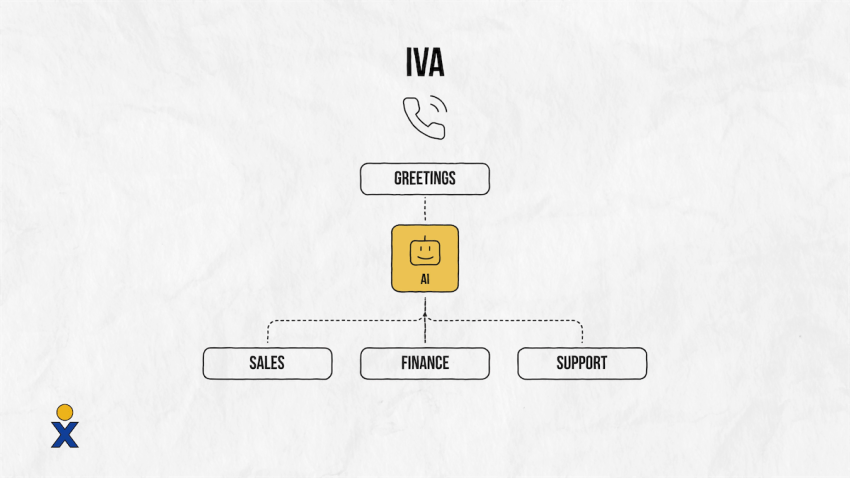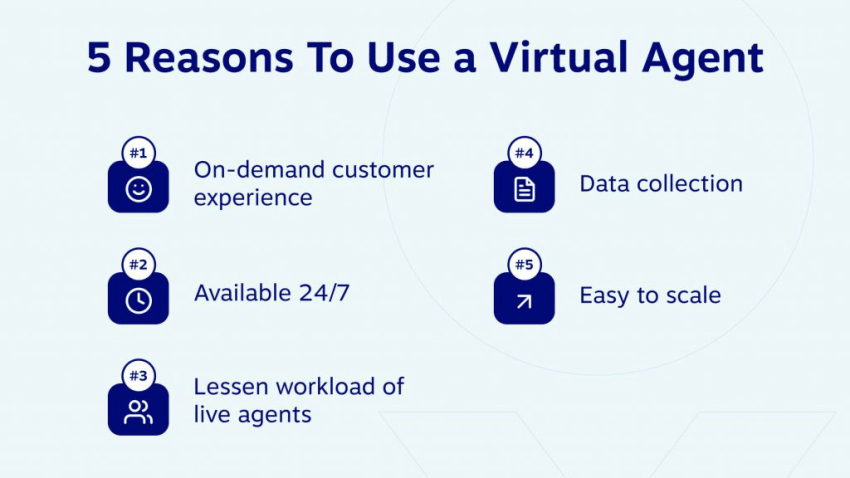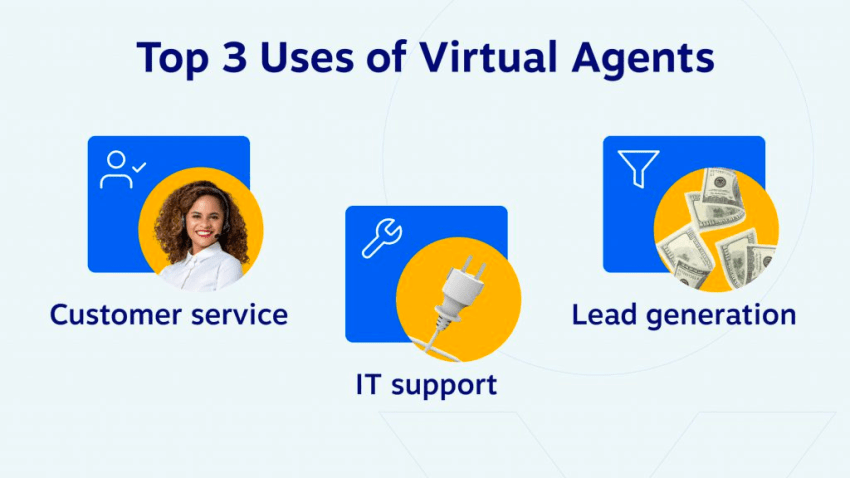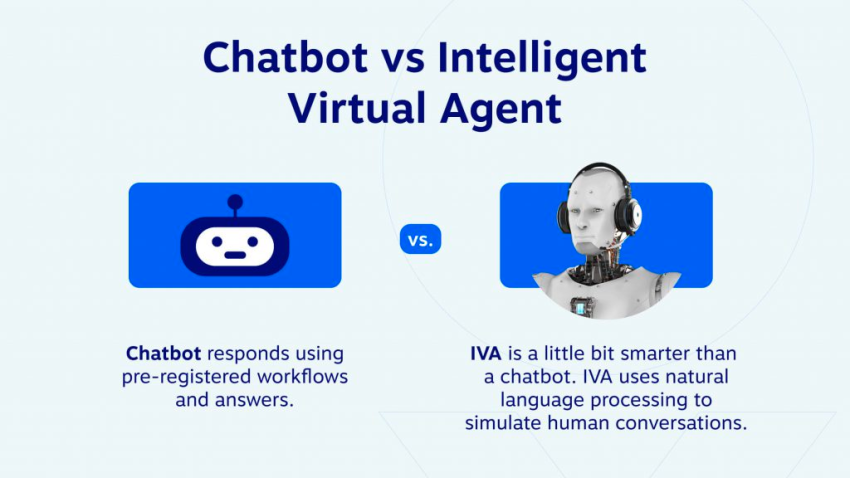AI assistants are catapulting how businesses interact with customers, and intelligent virtual agents are at the forefront. This software mimics human conversations to interact with customers and helps businesses scale their teams, resolve customer issues faster, and drive better customer experience.
In this article, we’ll learn more about intelligent virtual agents, explore some of their key features and use cases, and show you how you can also use them to improve your customer experience.
What Is an IVA (Intelligent Virtual Agent)?
An intelligent virtual agent (IVA), also called an intelligent virtual assistant or AI assistant, is a software program that uses artificial intelligence, natural language processing, and machine learning to provide automated and personalized assistance to users. These virtual agents can understand and respond to user requests, perform tasks, and make recommendations, simulating human interactions.
While virtual agents are sometimes confused with chatbots, they’re significantly more advanced and provide a critical level of service for many businesses.
Unlike traditional chatbots, which are limited to pre-programmed responses, IVAs use conversational AI to better understand the context of customer queries and enable more personalized and natural interactions.
IVAs can handle complex questions, examine multiple data sources, and tailor answers to the conversation’s context.

How IVAs Work
Intelligent virtual agents combine various technologies to understand user input, process information, and provide appropriate responses.
- Natural Language Processing (NLP): Allows IVAs to understand the meaning behind user text or speech. NLP techniques like tokenization, stemming, and sentiment analysis enable IVAs to break down sentences, identify keywords, and even gauge the emotional tone of a query.
- Machine Learning (ML): Machine learning algorithms power the continuous learning capabilities of IVAs. By analyzing vast amounts of data from past interactions, IVAs can identify patterns, improve their understanding of language nuances, and refine their responses over time.
- Artificial Intelligence (AI): AI acts as the central nervous system of an IVA, allowing it to process information, make decisions, and generate relevant responses to the context of the conversation.
When a user interacts with an IVA, the NLP engine parses the query, identifies keywords, and extracts meaning.
This information is then fed into the AI core, which uses its knowledge base and machine learning capabilities to determine the most appropriate response.
The IVA can then deliver helpful answers, complete tasks, or even escalate complex issues to human agents.

An intelligent virtual assistant in action
Scenario: A customer interacts with a banking IVA to check their account balance.
Customer: “Hey, can you tell me my current account balance?”
The IVA processes the user’s input using NLP, recognizes the intent as “check_account_balance,” and identifies the relevant entity as the customer’s account.
It then retrieves the account balance from the banking system and generates a natural language response: “Your current account balance is $1,500.”
The IVA logs this interaction for continuous learning and improvement, and if needed, it can handle follow-up questions or provide personalized assistance by integrating with external systems securely.
Benefits of Using Intelligent Virtual Agents
Adopting IVAs offers businesses a variety of benefits.

- Improved customer experience: IVAs use natural language understanding (NLU) to offer a human-like experience that can instantly assist customers in finding a solution, automating tasks such as answering FAQs and routing inbound calls to the right agent, reducing wait times.
- Task automation: IVAs can automate multiple workflows and offer self-service, such as scheduling appointments, setting reminders, making recommendations, and providing information, all of which reduce the burden of day-to-day tasks on customer service agents.
- 24/7 availability: Since virtual agents can respond to most typical inquiries, this effectively scales your customer support after hours and saves employee billable hours.
- Improved efficiency: IVAs help deflect customers from email, phone, and live chat in favor of AI assistants, ensuring that live agents directly assist customers with particular needs or sensitive situations that call for a personal touch.
- Data collection and insights: Virtual agents are an excellent way to amass actionable data collection since they converse via text. Analyzing this data and other applications of AI and natural language processing can produce valuable insights.
- Scalability and cost-savings: A good combination of virtual agents for repetitive tasks and support agents to manage inquiries that need human assistance can lead to better returns and a more sustainable business expansion plan.
- Omnichannel integration: IVAs can be integrated across multiple digital channels and devices, such as websites, mobile apps, SMS & messaging platforms, and smart speakers.
Virtual Agents Use Cases and Examples
Many businesses now use intelligent virtual agents to improve customer service, generate leads, and provide IT support.

IVAs can answer frequently asked questions, troubleshoot technical issues, track order status, and even facilitate returns.
When it comes to sales support, IVAs can aid in lead generation, qualify leads, answer product inquiries, offer personalized recommendations, and schedule appointments with sales representatives.
A virtual agent can also easily perform software updates, password resets, and simple IT support troubleshooting tasks. It can collect information and create a ticket for more complex requests, reducing the burden on IT teams.
Here are some specific examples of popular businesses using intelligent virtual agents:
- Retail: H&M uses an IVA to help customers find products, check stock availability, and get styling tips. The IVA drives better customer engagement and sales for H&M.
- Banking: Bank of America’s “Erica” IVA has over 10 million users and has handled over 100 million client requests. Erica can help customers with account inquiries, transfers, bill payments, and more.
- Telecommunications: Vodafone’s “TOBi” IVA handles over 70% of customer inquiries across multiple channels, reducing call volume to human agents and improving customer satisfaction scores.
- Healthcare: Babylon Health’s IVA provides symptom checking, appointment booking, and remote consultations with doctors. The IVA has helped reduce healthcare costs and improve access to care.
Related: Chatbot for Ecommerce: Features to Look for [+ Best Picks]
IVAs vs. Other Virtual Assistants
IVAs are part of a broader landscape of AI-powered solutions used in customer service and other business processes. It’s important to understand how it’s different from these key technologies so you can choose the right solution for your business.
Chatbots. Chatbots are relatively simple and typically answer basic questions or provide links to relevant information. They follow pre-programmed rules and cannot understand the context of a conversation.
Virtual agents are more sophisticated at simulating human speech, understanding customer intent, and answering real-time queries. You can also ask follow-up questions and forward chats to human agents if necessary.

Voice Assistants. Like IVAs, voice assistants like Siri, Alexa, and Google Assistant use NLP and machine learning to understand and respond to user queries. However, they’re primarily designed for voice responses and are often used for more general-purpose tasks like setting reminders or playing music.
Robotic Process Automation (RPA). RPA uses software “robots” to automate repetitive, rule-based tasks such as data entry or invoice processing. While RPA can help streamline back-office operations, it does not involve the same level of natural language interaction as IVAs.
Knowledge Management Systems. IVAs are often integrated with knowledge management systems that store information about products, services, and common customer issues. By connecting to these systems, IVAs can provide more accurate and up-to-date responses to customer queries.
Related: Conversational AI vs. Chatbots: Choosing the Best Solution
How To Implement Intelligent Virtual Agents
Creating and implementing an IVA requires careful planning and preparation. Here are some best practices for successful implementation:
- Define clear goals and use cases: Identify the specific customer service issues or business processes that an IVA could help with, and set measurable goals for improvement.
- Design effective conversation flows: Use a combination of decision trees, natural language understanding, and machine learning to create conversation flows that can handle a wide range of customer inquiries and provide personalized responses. You can use IVA software or a contact center solution to get a pre-built IVA with conversation flows for common use cases without building one from scratch
- Integrate with other systems: Connect your IVA with your CRM, knowledge base, and other relevant systems to provide a seamless customer experience and enable more advanced functionality like account lookups or transaction processing.
- Test and refine continuously: Monitor the performance of your IVA using metrics like customer satisfaction scores and first contact resolution rates, and continuously refine its knowledge base and conversation flows based on feedback and data analysis.
While implementing an IVA can be complex and require significant resources, the benefits in terms of improved efficiency, customer satisfaction, and cost savings are substantial.
Related: What You Need to Know Before You Use Chatbots for Your Website
The Future of Intelligent Virtual Agents
As AI technology continues to advance, IVAs will become even more sophisticated and widely used.
More powerful AI algorithms will enable virtual assistants to carry on natural conversations with even greater fluency and emotional intelligence. This will further blur the lines between human and machine interaction.
Integrated with other technologies like virtual reality (VR), IVAs can create immersive customer experiences. Imagine a virtual assistant guiding you through a product demonstration in a VR showroom.
While IVAs will handle routine tasks, human agents will continue to play a crucial role in dealing with complex issues and building genuine customer relationships.
Getting an Intelligent Virtual Agent for Your Call Center
Traditional IVA implementation can be a tangled mess of business needs, customer preferences, system integrations, and scalability concerns.
Nextiva cuts through the complexity with a comprehensive and innovative solution.
Our advanced IVR powered by conversational AI seamlessly integrates with our contact center software. This powerful combination helps you offer personalized service, maintain constant customer contact, and automatically optimize agent scheduling based on fluctuating call volume patterns.
But Nextiva’s support goes beyond the technology. Our dedicated team helps you find the perfect IVA configuration, tailored to your unique business needs.
Don’t let the challenges deter you. By prioritizing your needs, aligning with customer preferences, and ensuring smooth integration, you can unlock the benefits of IVAs.
Remember, it’s a strategic decision. Invest wisely and reap the rewards of improved service, efficiency, and growth.
Related: The Newbie’s Guide to Conversational AI Chatbots
Ready to give Nextiva a try?
Talk with an expert to unlock more business growth with IVAs.


















 Customer Experience
Customer Experience 








